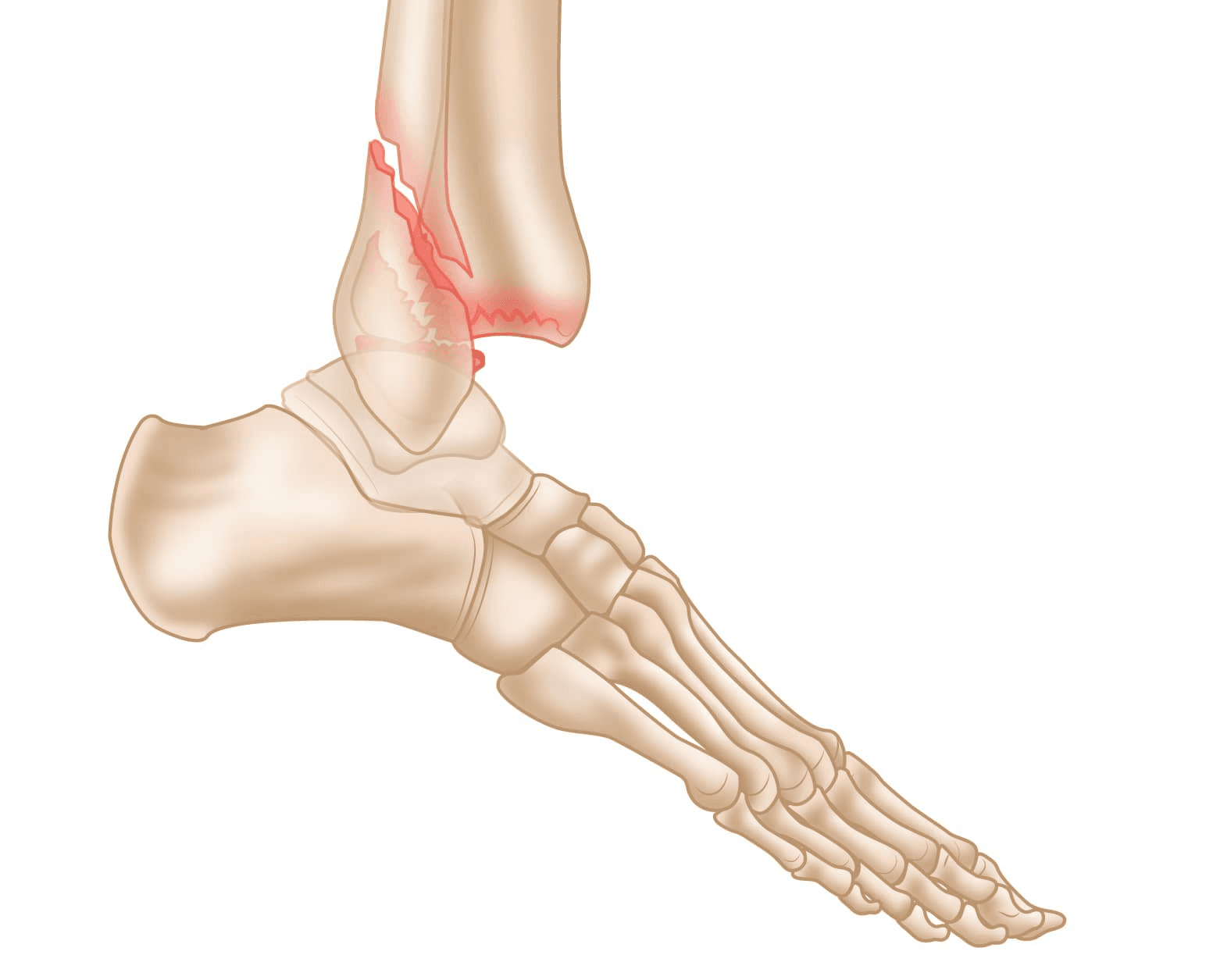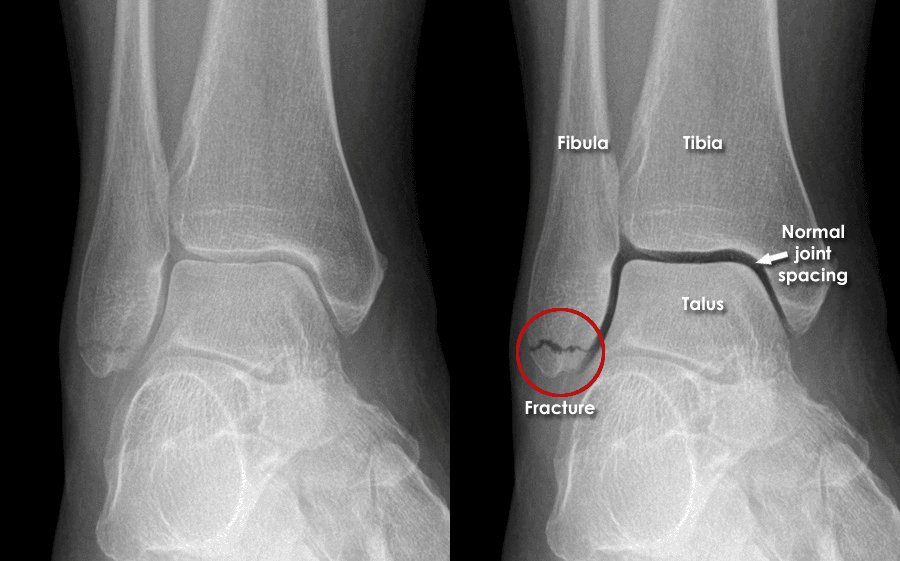
Ankle Fractures
Take the first step to better health with Dr. Chowdhury, our highly experienced Foot & Ankle Surgeon!
Request Appointment

Overview
An ankle fracture is a break in one or more of the bones that form the ankle joint, which can include the tibia (shinbone), fibula (smaller lower leg bone), talus (bone between the heel and leg bones) or all 3.
Type of Ankle Fractures
Fractures are classified by the affected bone areas:
- Medial malleolus: Inner leg protrusion
- Lateral malleolus: Outer leg protrusion
- Posterior malleolus: Back part of the tibia
A bimalleolar fracture involves two of these areas, while a trimalleolar fracture involves all three. Severity depends on the number of breaks, ankle stability, and ligament injury, and can involve a syndesmotic injury (the major ligament involved in holding 2 leg bones together).
Signs & Symptoms
Signs: Visible deformity, swelling, and bruising around the ankle.
Symptoms: Intense pain, especially when bearing weight, and difficulty moving the ankle.
Request Appointment
Struggling With an Ankle Fracture?
Diagnosis
X-rays
- Fluoroscopy
- Stress Views
CT
- 3D Reconstructions
MRI
- Soft Tissue
- Hairline Breaks
- 3D Reconstruction
Treatment & Recovery
Treatment:
- Treatment plans are tailored based on the type and severity of the fracture.
- Non-surgical options include immobilization with a cast or brace to allow the bone to heal naturally, along with rest, ice, compression, and elevation (RICE) to manage swelling and pain.
- For more severe fractures, surgical intervention might be necessary to realign and stabilize the bones using hardware such as screws, plates, or rods.
- Post-treatment care often involves physical therapy to restore strength, flexibility, and function to the injured ankle.
Non-Surgical
- Stable fractures or non-surgical candidates
- CAM boot or cast
- Non-weight-bearing measures
- Serial x-rays to monitor healing
Surgical
- Severe fractures with displacement or instability
- Hardware placement for stabilization (see "Ankle ORIF")
Proper diagnosis and treatment are key for recovery and long-term joint health.


Ankle Fractures
Take the first step to better health with Dr. Chowdhury, our highly experienced Foot & Ankle Surgeon!
Ankle Fractures
Take the first step to better health with Dr. Chowdhury, our highly experienced Foot & Ankle Surgeon!


Overview
An ankle fracture is a break in one or more of the bones that form the ankle joint, which can include the tibia (shinbone), fibula (smaller lower leg bone), talus (bone between the heel and leg bones) or all 3.
Types of Ankle Fractures
Fractures are classified by the affected bone areas:
- Medial malleolus: Inner leg protrusion
- Lateral malleolus: Outer leg protrusion
- Posterior malleolus: Back part of the tibia
A bimalleolar fracture involves two of these areas, while a trimalleolar fracture involves all three. Severity depends on the number of breaks, ankle stability, and ligament injury, and can involve a syndesmotic injury (the major ligament involved in holding 2 leg bones together).
Diagnosis
X-rays
- Fluoroscopy
- Stress Views
CT
- 3D Reconstructions
MRI
- Soft Tissue
- Hairline Breaks
- 3D Reconstruction
Signs & Symptoms
Signs: Visible deformity, swelling, and bruising around the ankle.
Symptoms: Intense pain, especially when bearing weight, and difficulty moving the ankle.
Treatment & Recovery
Treatment:
- Treatment plans are tailored based on the type and severity of the fracture.
- Non-surgical options include immobilization with a cast or brace to allow the bone to heal naturally, along with rest, ice, compression, and elevation (RICE) to manage swelling and pain.
- For more severe fractures, surgical intervention might be necessary to realign and stabilize the bones using hardware such as screws, plates, or rods.
- Post-treatment care often involves physical therapy to restore strength, flexibility, and function to the injured ankle.
Non-Surgical
- Stable fractures or non-surgical candidates
- CAM boot or cast
- Non-weight-bearing measures
- Serial x-rays to monitor healing
Surgical
- Severe fractures with displacement or instability
- Hardware placement for stabilization (see "Ankle ORIF")
Proper diagnosis and treatment are key for recovery and long-term joint health.






Ankle Fractures
Take the first step to better health with Dr. Chowdhury, our highly experienced Foot & Ankle Surgeon!
Ankle Fractures
Take the first step to better health with Dr. Chowdhury, our highly experienced Foot & Ankle Surgeon!


SPORTS FOOT &
ANKLE CENTER
Services
Achilles Tendonitis
Ankle Fracture
Lisfranc Injury
Ankle Sprain
... + 20 more
Testimonials
Liam Hester
John Hester
Kathy Gallagher
Kendra Grompone
Luke42 D’Altilio
Location
Contact
207-777-1245
dr.einfootandankle
@gmail.com
Request Appointment
Struggling With an Ankle Fracture?




Overview
An ankle fracture is a break in one or more of the bones that form the ankle joint, which can include the tibia (shinbone), fibula (smaller lower leg bone), talus (bone between the heel and leg bones) or all 3.
Types of Ankle Fractures
Fractures are classified by the affected bone areas:
- Medial malleolus: Inner leg protrusion
- Lateral malleolus: Outer leg protrusion
- Posterior malleolus: Back part of the tibia
A bimalleolar fracture involves two of these areas, while a trimalleolar fracture involves all three. Severity depends on the number of breaks, ankle stability, and ligament injury, and can involve a syndesmotic injury (the major ligament involved in holding 2 leg bones together).
Signs & Symptoms
Signs: Visible deformity, swelling, and bruising around the ankle.
Symptoms: Intense pain, especially when bearing weight, and difficulty moving the ankle.
Diagnosis
X-rays
- Fluoroscopy
- Stress Views
CT
- 3D Reconstructions
MRI
- Soft Tissue
- Hairline Breaks
- 3D Reconstruction
Non-Surgical
- Stable fractures or non-surgical candidates
- CAM boot or cast
- Non-weight-bearing measures
- Serial x-rays to monitor healing
Surgical
- Severe fractures with displacement or instability
- Hardware placement for stabilization (see "Ankle ORIF")
Proper diagnosis and treatment are key for recovery and long-term joint health.
Treatment & Recovery
Treatment:
- Treatment plans are tailored based on the type and severity of the fracture.
- Non-surgical options include immobilization with a cast or brace to allow the bone to heal naturally, along with rest, ice, compression, and elevation (RICE) to manage swelling and pain.
- For more severe fractures, surgical intervention might be necessary to realign and stabilize the bones using hardware such as screws, plates, or rods.
- Post-treatment care often involves physical therapy to restore strength, flexibility, and function to the injured ankle.
SPORTS FOOT &
ANKLE CENTER
Services
Achilles Tendonitis
Ankle Fracture
Lisfranc Injury
Ankle Sprain
... + 20 more
Reviews
Jessica Peri
Sameer Alam
Noman Saleemi
Andres Botero
…+ 6 more
Contact
201-777-1245
dr.einfootandankle@gmail.com
Location
SPORTS FOOT &
ANKLE CENTER
Services
Achilles Tendonitis
Ankle Fracture
Lisfranc Injury
Ankle Sprain
... + 20 more
Testimonials
Jessica Peri
Sameer Alam
Noman Saleemi
Andres Botero
…+ 6 more
Location
Contact
201-777-1245
dr.einfootandankle
@gmail.com
SPORTS FOOT &
ANKLE CENTER
Services
Achilles Tendonitis
Ankle Fracture
Lisfranc Injury
Ankle Sprain
... + 20 more
Reviews
Jessica Peri
Sameer Alam
Noman Saleemi
Andres Botero
…+ 6 more
Location
Contact
201-777-1245
dr.einfootandankle@gmail.com

